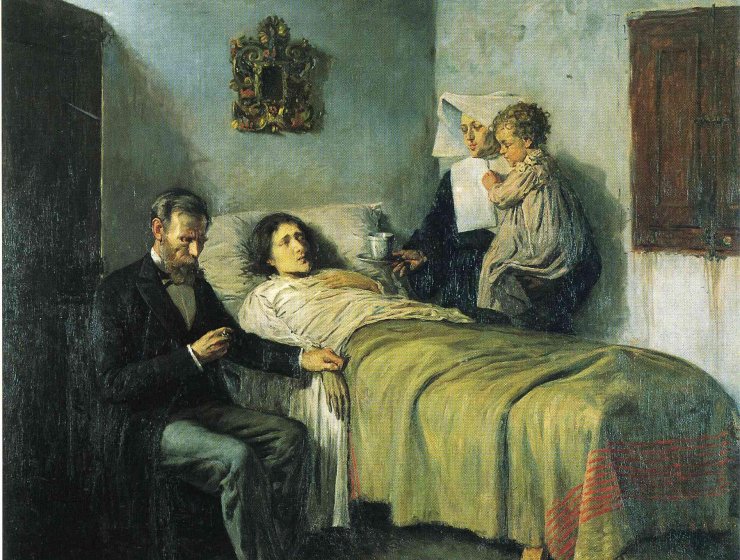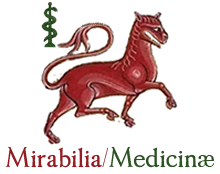
-Index-
Editorial: II UNESC Seminar of Medical Humanities
ANGOTTI NETO, Hélio
Original title: Editorial: II Seminário UNESC de Humanidades Médicas
The third edition of Mirabilia Medicinae is dedicated to publish the works that were presented in the II UNESC Seminar of Medical Humanities (Colatina, Espírito Santo - Brazil). It also brings special articles about the humanization of healthcare and medical education, and a book review about Medicine and ideological threats.
Research integrity and the impact of conflicts of interests on society: An Analysis in the Light of the Theory of Recognition of Axel Honneth
Márcia Cássia CASSIMIRO, Agemir BAVARESCO, André Marcelo M. SOARES
Original title: Integridade científica e o impacto dos conflitos de interesses na sociedade: Uma Análise à Luz da Teoria do Reconhecimento de Axel Honneth
Conflicts of interest (COI) is a set of conditions in which professional judgment concerning a primary interest tends to be unduly influenced by a secondary interest. In biomedical research, for example, secondary interests may affect research participants and bias research results. From a Honnethian perspective, struggles for recognition of COIs can be seen as a moral force driving social development with a focus on human dignity. Accordingly, Vasconcelos et al. have shown that in the last decades, the dialogue between science and society has reflected concerns over COIs and management of these conflicts in the realm of scientific publications. In this context, research supported by the pharmaceutical industry, for example, is a case in point. Although the extent to which this funding influences the behavior of researchers is not fully understood, there has been an increase in research misconduct in the last decades, and COIs play a role in many cases. As part of an ongoing doctoral project, this contribution makes a case that the training of Brazilian researchers in the health sciences and their understanding of science and society need to be revisited. We will address the process of construction of scientific knowledge and the ethical dilemmas encountered by these researchers when it comes to COIs in their professional and academic activities. Using elements of Honnethian philosophy, we aim to identify whether notions of COIs among this group arise from a mistaken understanding of public management of the research sector, resulting in social disrespect, reifying individuals in the process of participation in social control of the resources involved in research.
The Use of Eponyms in Medical Practice
Fleury Marinho da SILVA, Rodolfo Costa SYLVESTRE, José Guilherme Pinheiro PIRES
Original title: O Uso de Epônimos na Prática Médica
An eponym is a medical term derived from a person’s name, either real or fictitious. Several authors that stand against the use of eponyms in Biology or Medicine argue that the practice is anti-didactic because it is impossible to memorize over ten thousand existing eponyms, the same eponym may designate two different biomedical entities, or the eponyms can render tribute to infamous physicians. However, there are authors who support their use and describe that its practice is a medical art, reflecting the medical history over the years. For them, the use of eponyms is a correct attitude of recognition and a deserved tribute to those who contributed with their observation and research for developing the medical sciences.
Beliefs, Values and Social Representations of Normal Birth
Luciano Antonio RODRIGUES, Bruno Alves da SILVA, Priscila Margarete Araújo Beserra VALENTIM
Original title: Crenças, Valores e Representações Sociais do Parto Normal
Abstract: Introduction: Giving birth is a special moment in the women universe, since it brings new feelings in the very essence of being a woman: the act of being a mother is central. Pregnancy and delivery links men’s reproduction aspects as well as women’s, involving their families and the community. Everyone who participates in this experience are enriched by hope and the joy it brings, bringing up feelings that defines a human being. Objective: to learn how vaginal birth seems like to women having their first child, how it affects social characteristics as well as beliefs and values. Methodology: this is a short-term exploratory study with 15 first child mothers regarding qualitative and describing views. The study was done in a maternity hospital in the city of Colatina, Espírito Santo, Brazil. The data was collected through recorded interviews based on a semi-structured script, its variables related to social and demographic differences, approaching their experiences towards vaginal birth. Data was analyzed by the Lerass’ software IRaMuTeQ version 0.6 Apha 3, in which it was possible to achieve content about the interviews, word cloud creation and similarities analysis. Conclusion: Vaginal birth is socially associated with pain, related not only to suffering but also to the idea of overcoming. Another subject to consider is the ignorance towards the procedure. That generates hopes, uncertainties, fears and anxiety. One of the great challenges for shifting the paradigm of vaginal birth is the deconstruction of negative feelings and beliefs, bringing back women’s independency and the joy of giving birth. To give birth is an act that should be one of the greatest experiences of women inside her reality and accordingly to her unique role in what is one of the most important part in the great universe that is human birth.
Humanizing the Biomedical Model, and the Quality-of-Care Crisis
James A. MARCUM
Original title: Humanização do Modelo Biomédico e a Crise na Qualidade do Cuidado com a Saúde
In this paper, I explore the philosophical issues concerning the efforts of philosophers and clinicians to humanize the biomedical model of medical knowledge and practice to address the quality-of-care crisis. To that end, I discuss the metaphysical, epistemological, and ethical dimensions of the biomedical model and its humanization. I begin with metaphysics, exploring the presuppositions upon which modern medical knowledge and practice are founded; for presuppositions determine the entities that compose the medical worldview. Next, I examine the epistemological issues that face the humanization of the biomedical model, particularly those driven by methodological procedures undertaken by epistemic agents to constitute medical knowledge and practice. Finally, I investigate the ethical implications of the biomedical model and of its humanization, especially in terms of the physician-patient relationship. In a concluding section, I discuss the issues surrounding the question of the humanization of the biomedical model in terms of the quality-of-care crisis.
Bioethics in the process of medicine's humanization: an interdisciplinary approach
Euler Renato WESTPHAL
Original title: A Bioética no processo de humanização da medicina: uma abordagem interdisciplinar
This essay presents the discussion about humanization in the education of the physicians. This humanization has been necessary because the human being has been included in the contemporary notion of science, which reduced reality to its mechanical aspects. Bioethics in its origins was meaningfully influenced by theology, which had the function of connecting science and healthcare. In search for the rescue of interdisciplinarity in medical schools, the goal is to overcome the dichotomized and segmented model of modern sciences. Theology could be a bridge between the humanization in medical education and the care of the patient in the face of death. The objective is to demonstrate temporarily the manner how interdisciplinarity among bioethics, theology and medical education could propel humanization in medicine.
Book Review: Angotti Neto and the case against Medicine as Ideology
Ivanaldo Oliveira dos SANTOS FILHO
Original title: Resenha Literária: Angotti Neto e a denúncia da medicina como ideologia
The book denounces the ideological invasion suffered by the Medicine in the last decades. It also shows how the healthcare professional can be used as a tool of social engineers, corrupting the original ideals of Medicine.


















































































